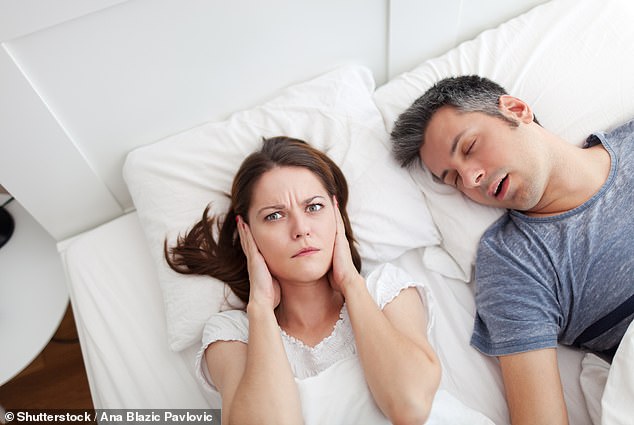It’s a well-worn trope that mothers will wake at the slightest stir from their baby while fathers peacefully doze on.
But scientists now say that dads have no excuses for missing midnight nappy changes.
Scientists from Aarhus University in Denmark found that men were just as likely to be woken by the sounds of crying as women.
While women were slightly more likely to be woken by ‘whisper level’ sounds, computer modelling shows this cannot explain why they do so much more of the care.
The researchers monitored 142 non-parents while they slept and recorded how often they woke up in response to the sound of a baby crying.
Women were, on average, about 14 per cent more likely to wake up to sounds between 33 and 44 decibels – about as loud as birdsong or a library.
However, men and women woke with the same frequency as soon as the volume started to approach that of a real baby’s crying.
Lead researcher Professor Christine Parsons told MailOnline: ‘We had participants all waking up and we didn’t have evidence that men were sleeping through.’

Scientists have busted the myth that men are more likely to sleep through a baby’s crying than women, finding only minor differences in how the sexes respond to nighttime noises
Although the idea that men can sleep through their baby’s crying is a myth, there are real reasons to think that women might wake up more frequently in the night.
Studies have shown that women tend to report more disturbed sleep overall, regardless of sounds.
Likewise, research suggests that women might be more sensitive to high-pitched sounds.
However, Professor Parsons’ research, published in the journal Emotion, shows that any differences only translate into small changes in waking patterns when the sounds are very quiet.
More importantly, these small statistical differences cannot explain the large gap in care burdens.
In a second trial, the researchers gave 117 first-time Danish parents an app to log their nighttime care over a week.
Then, the researchers used simulations to predict what that distribution of nighttime care would look like if the only factor were those differences found by the first study.
Professor Parsons says: ‘What we found was that women did 75 per cent of the nighttime caregiving.

Women were slightly more likely to be woken by ‘whisper level’ sounds, but any differences disappeared when the volume increased
‘If we estimate how much caregiving would emerge from that small difference [in sound responses], it would look much more equal between men and women.’
What this shows is that inherent biological or psychological differences in how men and women respond to sounds in the night cannot explain why women do more of the care.
These findings come in stark contrast to the extremely widespread myth that men aren’t as easily woken by their children.
In particular, Professor Parsons singled out an influential but unscientific survey funded by Lemsip, which claimed that the sound of the wind or the buzz of a fly were more likely to wake men than the sound of a child crying.
While these findings weren’t peer-reviewed and had no scientific merit whatsoever, these ideas have spread extremely far.
Professor Parsons says: ‘When I talk to scientists at conferences, they have actually heard of it and say, “Wasn’t there that paper on waking behaviour?”‘
‘But these are phantom papers and phantom ideas, and if an idea confirms a suspicion or a belief that people have, then it is very difficult to change people’s minds about it.’
The study focused on adults without children in order to see whether pre-parenthood gender differences alone affected nighttime care patterns.

Missing out on too much sleep can lead to obesity, memory loss, diabetes, heart disease, heightened and unstable emotions, impaired ability to learn and a reduced immune response, leaving you vulnerable to disease
However, pregnancy and childbirth cause massive hormonal changes that might affect waking times.
There are also good reasons why new mothers might get up more in the night, especially if they are breastfeeding.
Similarly, men in the OECD receive an average of 2.3 weeks of parental leave compared to 18.5 weeks for women.
This means women get more practice caring for babies at night and don’t have to wake up for work in the morning.
All of these other factors, alongside societal expectations, are likely to be important in explaining why women do so much more of the nightly care.
Professor Parsons says: ‘I’m not excluding any of those things, but this is not really what our paper is about.
‘What we were trying to test is a very specific question about how men and women can or cannot sleep through different types of sounds.’





